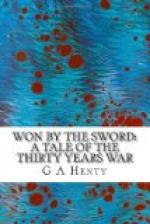“You see now, de Lisle,” Chavigny said, “the advantage of taking a morning dip in snow water. Neither you nor I would have swum across those moats, and remained all night long in our wet clothes, for a thousand crowns.”
“No, no, nor for five thousand,” the other laughed. “Pass me the wine; it makes me shiver to think of it. I fancy we may as well admit at once that if the mission had been entrusted to us, we should have made a mess of it. We should have been shot by the guards in the first street we entered. As to climbing along the roofs of houses till we had passed the first line of sentinels, the idea would never have entered our heads. Of course we might have disguised ourselves, and might have got into the town by harnessing ourselves to a load of faggots, but once there we should have had no more chance of getting into the fortress than if we had at once proclaimed ourselves French officers, and had requested a pass into the citadel.”
For the next ten days every effort was made to obtain carts and pack horses from the villages round Susa, and a number of wagons filled with provisions were brought from Carignano, where the principal supplies for the army had been collected. On the fourteenth day all was ready, and late in the afternoon the convoy, with fifteen hundred men from Susa, and four pieces of artillery, marched out. At the same hour the force at Carignano, six thousand strong, leaving only a small body to garrison the city, started for Turin along the farther bank of the Po, and just as day broke a heavy cannonade was opened by them against one of the city gates.
Astonished and alarmed, the troops in the city flew to arms, and hurried to repulse the attack. A quarter of an hour later the dim light of the morning showed the astonished sentries at the end of the town surrounding the citadel a considerable force advancing to the attack of the gate there, opposite which, at a distance of two hundred yards, four cannon were placed, and scarcely had they made out the enemy when these opened fire. A few rounds and the gate was in splinters, and the infantry rushed forward. The sentries on the walls took to flight, and the assailants pushed forward to the inner gate. Access was obtained from that side to the citadel, and then, under the direction of their officers, the assailants occupied all the side streets. At once the procession of carts was allowed to pass along. Some of the garrison ran down and lowered the drawbridge across the moat, and amid exultant shouts a store sufficient for many months was conveyed into the citadel. The carts as quickly as they were unloaded returned through the gates and passed out Into the country beyond. By this time a fierce fight had begun. As soon as the firing was heard opposite the citadel, Prince Thomas and his military advisers guessed at once that the attack had been but a feint, made with the object of effecting the relief of the citadel, and calling several regiments




